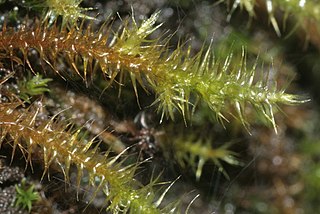
Funaria is a genus of approximately 210 species of moss. Funaria hygrometrica is the most common species. Funaria hygrometrica is called “cord moss” because of the twisted seta which is very hygroscopic and untwists when moist. The name is derived from the Latin word “funis”, meaning "a rope". In funaria root like structures called rhizoids are present.

Fissidens is a genus of over 480 species of haplolepideous mosses (Dicranidae) in the family Fissidentaceae.

Dicranaceae is a family of haplolepideous mosses (Dicranidae) in class Bryopsida. Species within this family are dioicous. Genera in this family include Dicranum, Dicranoloma, and Mitrobryum.

Neckeraceae is a moss family in the order Hypnales. There are about 200 species native to temperate and tropical regions. Most grow on rocks, or other plants.

Grimmia is a genus of mosses (Bryophyta), originally named by Jakob Friedrich Ehrhart in honour of Johann Friedrich Carl Grimm, a physician and botanist from Gotha, Germany.

Barbula is a genus of mosses in the family Pottiaceae.

Ditrichum is a genus of haplolepideous mosses (Dicranidae) in the family Ditrichaceae.

Amblystegiaceae is a family of mosses. It includes 20 to 30 genera with a total of up to 150 species. They occur nearly worldwide, growing in tropical, temperate, and subpolar regions.

Taxiphyllum is a genus of mosses in the family Hypnaceae.

Syntrichia is a large, cosmopolitan genus of mosses in the family Pottiaceae. The genus name is of Greek origin for "with" and "hair", referring to the "twisted peristome united by a basal membrane".

Didymodon is a genus of mosses belonging to the family Pottiaceae. The genus has a cosmopolitan distribution.

Homomallium is a genus of moss belonging to the family Hypnaceae.

Philonotis is a genus of mosses belonging to the family Bartramiaceae.

Plagiothecium is a genus of moss belonging to the family Plagiotheciaceae. It has a cosmopolitan distribution.

Vesicularia is a genus of mosses belonging to the family Hypnaceae.

Trichostomum is a genus of mosses belonging to the family Pottiaceae.

Oxyrrhynchium is a genus of mosses belonging to the family Brachytheciaceae. The genus has a cosmopolitan distribution.

Pylaisia is a genus of mosses belonging to the family Pylaisiaceae.

Plagiotheciaceae is a family of mosses from the order Hypnales. It is found almost nearly worldwide, including Antarctica. Located primarily in temperate latitudes and at higher elevations in the tropics.



















